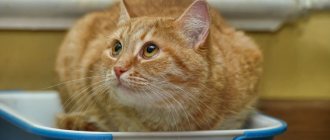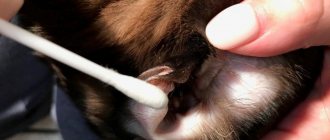Cystitis is an inflammation of the bladder. This disease is common in cats because their urethra (urethra) is quite short and wide. This allows various bacteria to penetrate from the perineal area into the bladder.
Experts from a leading veterinary clinic in Moscow are talking about how to promptly detect cystitis in your pet, what can cause this disease and whether it can be treated.
Read in this article:
What is the danger of the disease? Signs of cystitis: what to look for? Common causes of the disease Forms of cystitis and their characteristics Diagnosis of the disease Treatment of cystitis Pet care Prevention of cystitis in cats
Causes of cystitis in cats
Why do cats develop cystitis? The main reasons are considered to be the following:
- penetration of bacteria into the bladder cavity (may be a consequence of an existing infectious pathology, weakened immunity);
- lack of fluid in the body;
- diabetes;
- helminthiases;
- injury to the urinary tract, internal organs (for example, due to a fall);
- weakening of the immune system;
- hypothermia;
- stones in the bladder.
Cystitis in cats develops even due to stress. This could be moving, separation from the owner, the appearance of a new tenant (adult, child, animal) in the house, and so on.
Treatment at home
The disease, if you start treating it on time, is not terrible, but complications are dangerous. Therefore, you need to be attentive to your furry pets.
Pathogens
The causative agents of cystitis are staphylococcus or Escherichia coli. Infectious diseases cause inflammatory processes. It is possible to become infected during castration or exacerbation of chronic diseases. The cause may be: stress, bruise, fungal pathologies.
Survey
It is difficult to diagnose the disease at home; a full medical examination of clinical symptoms, tests and ultrasound of internal organs is necessary.
Advanced stages of the disease
If the disease is not diagnosed in a timely manner, an advanced form occurs, characterized by the development of a purulent process in the bladder and kidneys, the formation of stones, and later, paralysis of the bladder.
Drug treatment
An accurate diagnosis, treatment and medications can only be prescribed by a veterinarian, based on the results of a medical examination. In the hospital, a catheter is inserted into the bladder under anesthesia, and, if necessary, concomitant chronic pathologies are treated.
Herbal infusions
The following herbal remedies are very helpful in treatment:
- from horsetail;
- bear ears made from grass;
- from dill seeds and calendula flowers;
- from mint herb.
Are there risk groups?
Cystitis in a cat
Any pet with a mustache can get cystitis, but cats and kittens can be identified as being at risk. First of all, weakened animals are susceptible to cystitis: those who have had the disease, newborns, and the elderly. Since their immune system is reduced, any infection or cold living conditions can trigger an inflammatory process.
Experts also note that cats are more susceptible to cystitis than cats. And if you compare sterilized (castrated) animals with those who have not undergone surgery, the former get sick more often. This may be due to both a weakened immune system and an infection introduced during the operation.
Read also
Urolithiasis in cats
Urolithiasis is a disease accompanied by the formation and deposition of urinary stones or sand
Castration of cats: pros and cons
Castration is the removal of the male gonads (testes in males, ovaries or ovaries and uterus in females)
Ear mites in cats: signs and treatment
The appearance of a parasite such as ear mites in a cat is the beginning of a serious disease that must be eradicated at the first symptoms.
Worms in cats: symptoms, signs and treatment
The first signs of infection may be absent for some time or resemble manifestations of other diseases
Sterilizing a cat: at home or in the clinic?
Sterilization is an intervention as a result of which an animal (a cat in particular) loses its ability to reproduce
Types of cystitis in cats
The following types of cystitis in cats are distinguished:
- hemorrhagic – occurs in an acute form, there is blood in the pet’s discharge;
- serous-catarrhal – characterized by the presence of turbidity and mucus in the discharge;
- purulent – characterized by the presence of pus in the urine;
- idiopathic - is difficult to study, since it does not depend on any factors, and occurs in rare cases.
Depending on the nature of the disease, acute and chronic cystitis are distinguished. The first in most cases flows into the second, even if completely cured. The chronic form requires special attention to the pet, since the slightest mistake can provoke an exacerbation, for example, a slight change in diet or a draft in the summer.
Decreased appetite in an animal
Even before the appearance of symptoms of a critical condition, the animal’s appetite worsens. The cat eats little and becomes more selective in food. Your pet may lose serious weight. The wool loses its silkiness and shine and becomes dull. The cat plays less and shows lethargy in its behavior.
If you notice your cat's anxiety, loss of appetite, weight loss, meowing when urinating, or blood in the urine, contact a veterinary clinic immediately. There is no need to wait for more serious symptoms to appear; even meowing when going to the litter box indicates that the disease is progressing. Timely contact with specialists will help treat the disease without surgical intervention.
- Author: Elena Romanenko
Rate this article:
- 5
- 4
- 3
- 2
- 1
(224 votes, average: 3.9 out of 5)
Share with your friends!
Symptoms of cystitis
The main sign of cystitis in cats is pain. Due to severe pain, the mustachioed pet’s behavior changes:
- a cat can go to the toilet anywhere in the house, even if it is litter box trained;
- due to pain during urination, the animal makes corresponding plaintive sounds;
- after the cat goes to the toilet, its gait changes - it bends its back a little and seems to “drag” its legs;
- the pet's urge to urinate becomes more frequent;
- the cat may not move for a long time;
- the animal often licks the perineum.
Due to the soreness of the abdomen, the cat does not allow him to be touched, he breaks out and meows. Other symptoms are gradually added: body temperature rises, bloody or purulent discharge appears from the genitals, the animal refuses to eat, and in some cases it develops a gag reflex.
Diagnosis of cystitis
Before treating cystitis in cats, it is necessary to conduct a diagnostic examination. Urine for analysis can be collected at home and then brought to the clinic with your pet. To make a diagnosis, your veterinarian may order an ultrasound or x-ray. Using cystoscopy, a specialist will examine the mucous membrane of the bladder and urinary tract. A scraping from the urethra and subsequent bacteriological analysis will help determine the pathogen. In each case, it is necessary to undergo general urine and blood tests.
Diagnostics in a veterinary clinic
Preliminary diagnosis consists of collecting anamnesis, assessing the general condition of the pet, and palpation. A complete picture can be obtained after the following procedures:
- studying blood and urine tests, any deviations from the norm will be displayed in an unstandardized number of basic indicators;
- blood biochemistry studies, analysis will help determine the degree of damage to the urinary system;
- Ultrasound, which helps to track the presence or absence of tumors in the kidneys;
- Bacteriological culture can determine sensitivity to antibiotics, and the causative agent of the disease is determined.
If necessary, x-rays and cystoscopy are prescribed. Cystoscopy focuses on the inner surface of the bladder. The image will allow you to track the condition of the internal organs.
Application of Stop Cystitis
Stop cystitis for cats
Among other herbal preparations intended for the treatment of cystitis in cats, the most popular among owners and veterinarians are Stop Cystitis and its modification Stop Cystitis Bio.
It is not for nothing that the medicine is considered the best: it effectively eliminates the inflammatory process, has a diuretic and antimicrobial effect, relieves spasms and eliminates pain in many pathologies of the feline urinary system, as well as cystitis. The first option is presented in tablet form and in the form of a suspension, the second - only a suspension. The average cost of drugs is 200 rubles, while Bio costs 20-30 rubles more.
- Stop cystitis. Contains components of plant origin and is used as a medicinal product. It has a complex effect on the organs of the animal’s urinary system. Typically, a single dosage of the drug is 2-3 ml of suspension or 1-2 tablets. When treating a disease, it is taken twice a day, and for preventive purposes - once. Course duration is 5-7 days. Can be given to newborn kittens and cats awaiting replenishment.
- Stop Cystitis Bio. More relevant to additives with preventive and therapeutic effects, as an addition to basic medications. Allows you to improve the functioning of the kidneys and bladder, alleviates their condition during the recovery period, prevents the formation of sand and stones, and relieves inflammation at the initial stage. Despite the fact that this is a biological additive, it can only be used as directed by a veterinarian. The dose, frequency of administration and duration are the same as the previous option, unless otherwise specified by a specialist.
Although Stop Cystitis is of natural origin, according to the instructions there are contraindications for use: heart and vascular diseases, kidney failure. Stop Cystitis Bio can be given to all cats without exception. Both drugs practically do not cause adverse reactions, but sometimes individual intolerance to some ingredients is possible in animals.
Is it possible to use folk remedies?
When treating cystitis in representatives of the cat family, it is permissible to use traditional medicine methods as additional ones and only with the permission of a veterinarian. Firstly, this is due to the fact that folk recipes alone cannot completely cure the disease (at best, it will become chronic). Secondly, not all remedies suitable for treating humans are suitable for cats. In addition, some herbal remedies can not only neutralize the effects of medications, but also react with them, leading to serious side effects.
As a rule, diuretic and anti-inflammatory herbs and preparations are used for cystitis. The most popular are linden, dandelion, calendula, birch, and bearberry. The prepared infusion is given to the pet in small quantities (according to age) several times a day.
Sometimes it is advised to give the cat warming compresses or place a heating pad on the bedding. However, such measures can lead to the opposite result: cause exacerbation or complications, deterioration of the animal’s condition.
First aid and treatment
If the animal is suffering from severe pain, an antispasmodic may be used. The exact dosage depends on the weight and age of the pet, but it must be agreed with your veterinarian.
Temporary abstinence from food will help reduce the load on the kidneys, but you need to monitor your fluid intake. This helps reduce the concentration of urine and remove some bacteria from the body.
The pet should be placed in a place protected from drafts to prevent the progression of cystitis. It is not recommended to carry out palpation on your own; excess pressure on the organ can lead to rupture of soft tissues.
Features of caring for a cat with cystitis
Treatment of cystitis in cats is usually carried out at home, which imposes certain obligations on the owner and requires increased vigilance. The main thing is that the pet is isolated from drafts (even in the warm season), and also does not experience stress.
The cat needs to be provided with a warm place to rest and sleep; under no circumstances should it be damp or wet. You should not take any measures to warm the bedding; laying a warm blanket is enough.
Particular attention should be paid to the nutrition of the furry patient. If the animal is accustomed to eating industrial food, then it is necessary to choose the most suitable one. The doctor will tell you which one, since the medicinal compositions differ from each other, and at different stages of the disease you will need to buy a specific composition. Cheap mixtures should be eliminated immediately. For cystitis, it is recommended to purchase:
- Hill's c/d Feline Urinary Stress;
- Royal Canin Urinary S/O Feline High Delution;
- Royal Canin Urinary S/O Feline Pouches.
When feeding a cat naturally, it will need to be “put” on a special therapeutic diet with a reduced amount of protein products and salt. In case of cystitis, any fish and all dishes based on it are completely excluded from the pet’s diet.
It is allowed to feed the animal boiled meat products, sour cream, cottage cheese, kefir no more than twice a week. The main menu should consist of grain porridges (millet, buckwheat, oatmeal), vegetables, and broths.
Medicinal feed
A standard diet is not acceptable during therapy. Natural food should contain a minimum amount of fat and protein, but the norm is difficult to determine on your own. The task can be simplified by using a line of specialized high-class medicinal feeds. The composition contains the necessary list of components, vitamins, and a small amount of salt. There is a weak diuretic effect.
Using medicated food on a regular basis will help:
- reduce the amount of salts in the urine;
- increase the rate of primary urine formation per unit time;
- protect the liver from excess stress;
- normalize the flow of urine from the bladder.
The brand is selected by a veterinarian. Popular and trusted brands include Hill's, Royal Canin, Purina, Advance, etc. It is allowed to change feed when diagnosing urolithiasis. This will regulate the acidity of urine.
Switching your pet to a new food is extremely simple: you need to mix it into the old one, gradually increasing the amount. A sudden change can lead to an allergic reaction or gastrointestinal upset.
Preventive actions
Some preventive measures will reduce the likelihood of cystitis in a cat to a minimum. Among them, special attention should be paid to the following recommendations:
- the animal must eat fully and correctly, in accordance with its age and physiological characteristics;
- The cat must always have a bowl of clean water;
- The pet should not be allowed to eat only dry food; the diet should be varied;
- The mustachioed pet’s resting place should not be located in a draft, near an air conditioner or fan;
- do not feed the cat “from the table”, completely eliminate smoked, fatty, fried and spicy foods, as well as sweet foods;
- exclude stressful situations - do not punish physically and do not put pressure on the psyche;
- If your cat has already had cases of bladder inflammation or other diseases of the urinary system, it is important to carefully monitor its condition, preventing the development of exacerbations and always having medications on hand.
Recovery can only be achieved if the specialist’s instructions are followed. It should be remembered that cystitis in cats can return at any time, so the owner is required to love and take care of his pet, providing him with timely assistance.











